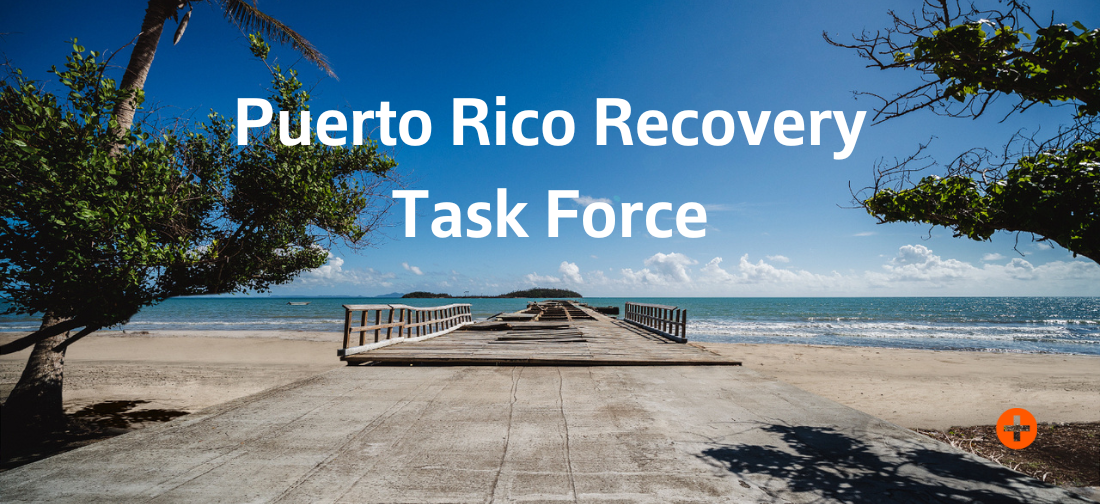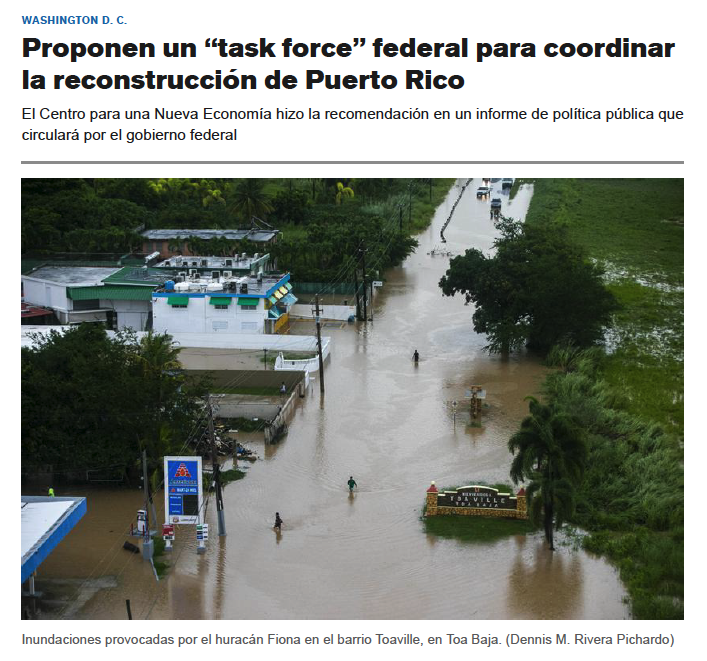
Published on September 29, 2022 / Leer en español
In This Issue
Hurricane Fiona has opened a window of opportunity for government officials in Washington, D.C. and Puerto Rico to streamline the ongoing Hurricane María recovery process and to correctly frame the Hurricane Fiona response.
In this Review, we will emphasize the need for: (1) creating a distinct recovery coordination mechanism: the Puerto Rico Recovery Task Force; (2) implementing specific principles that allow for reflection, flexibility, and adaptability; and (3) executing some key policy priorities to promote equitable economic growth and enhancing local capacity.
In advocating for the Puerto Rico Recovery Task Force, we have identified a very specific and particular kind of coordination mechanism that satisfies a discrete set of procedural, equity, and inclusion principles. CNE would not support any similar entity that does not satisfy the principles or fails to implement the policy priorities stated here.
For the sake of clarity and the avoidance of any doubt, we are not advocating for the “federalization of the recovery process” (whatever that may mean); the appointment of a “recovery czar” in the White House; or the “takeover” of the recovery process by the Fiscal Oversight and Management Board.
To achieve a just recovery, Puerto Rico needs coordination and oversight that works — not punitive measures. Successful recoveries require ongoing deliberation and dialogue between all involved stakeholders to ensure that all relevant perspectives are heard and have a chance to influence the process. Moreover, appointing a “recovery czar” or “federalizing” the process would not provide opportunities for local capacity-building.
When an isolated office dictates the recovery process from the top down, the opportunity for local actors to be involved in decision-making and learn key lessons in recovery management is lost. Centralizing the recovery also centralizes information flows, and can pose a threat to accountability and transparency if the newly created entity is not answerable to other actors involved in the recovery.
Click here to read the complete Policy Brief or continue reading for a summary.
–Sergio M. Marxuach, Editor-in-Chief
Insights + Analysis from CNE

By Sergio M. Marxuach, Policy Director
With contributions from:
Deepak Lamba-Nieves, Ph.D. – Research Director
Francis G. Torres – Senior Policy Analyst
A Failure to Communicate
Disaster recovery efforts are usually fraught with uncertainty and complexity at every level —economic, political, and emotional — and also stress-test the capacity of local governments and relief organizations to respond and advance reconstruction efforts in a prompt and equitable fashion. Rebuilding devastated communities under a compressed timeframe, often juggling competing demands and problems that arise on a daily basis, and that are equally urgent, can prove challenging even in the best-prepared jurisdictions.
In addition, at any given time in a post-disaster context, there are many actors working rapidly and independently, which need to coordinate their actions while relying on imperfect information, and their interactions and intersections are important throughout every stage of the process.
Unfortunately, in Puerto Rico after Hurricane María, this coordination process has been flawed, at best. Click to read about the communication and coordination challenges with which Puerto Rico has been contending.
At this juncture of Puerto Rico’s recovery, the haze surrounding the status of the recovery process highlights the need to carefully define precise planning, coordination and implementation frameworks, and improve the flow of information. In other words, there is a need for an entity to comprehensively coordinate and manage Puerto Rico’s recovery.
Statement of Principles
As we stated five years ago, CNE believes that any entity or mechanism designed to manage the recovery process should comply with the following principles:
- Promote coordination and cooperation
- Legitimacy — Provide a forum for the participation of the democratically elected government of Puerto Rico
- Comply with the principle of subsidiarity
- Inclusiveness — Provide for the participation of stakeholders from the private and the NGO sector
- Maximize the economic impact and strengthen the local economy
Click to read more about these principles.
Policy Priorities for the Recovery
In keeping with the principles above, CNE has identified three policy priorities to ensure that the next phase of the recovery process promotes equitable economic growth and enhances local capacity.
These priorities incorporate best practices from the recovery processes in New Orleans and New York in the aftermath of Hurricanes Katrina and Sandy, respectively, as well as lessons learned from the Hurricane María response through CNE’s ReImagina Puerto Rico project
- The recovery requires a “bottom-up”, comprehensive, and unified planning effort,
- Municipalities need to be engaged, and
- Island contractors need to be prioritized in the recovery process.
Click to read more about these priorities.
A Proposal to Implement Principles and Policy Priorities for the Reconstruction: the Puerto Rico Recovery Task Force
One way to implement these principles and priorities would be by creating an entity similar to the Hurricane Sandy Rebuilding Task Force, which was created by President Obama pursuant to Executive Order 13632 of December 7, 2012 (the “Sandy Executive Order”). Click here to read more on the Sandy Executive Order.
In our view, if a similar entity were to be created to coordinate the recovery process for Hurricanes María and Fiona, it would comply with the principles and policy priorities set forth above because:
- It would have an explicit mandate to coordinate recovery efforts among and between the federal agencies and among and between the federal government and the government of Puerto Rico.
- It would provide for the inclusion of Puerto Rican elected officials at all levels and their representatives, including the COR3, through an advisory group.
- It would promote subsidiarity and inclusiveness by engaging local stakeholders, municipalities, community organizations, NGOs active in Puerto Rico, and business leaders.
- And it would strengthen the local economy by ensuring that residents of Puerto Rico and local business enterprises are hired on a priority basis.
Conclusion
We have learned much during these five years after Hurricane María, and our recommendations reflect this. If properly designed and implemented the proposed mechanism would facilitate effective coordination among stakeholders at different levels of government, insure adequate public participation in the planning and oversight process, provide greater transparency and accountability in the project selection phase and the use of funds, and speed up the outlay of recovery funds.
To move forward, Puerto Rico must seize this opportunity to evaluate the hurricane recovery process and modify the existing recovery governance framework. In the final analysis, every disaster is “a time of desperate loss, yet also a time of distinct possibility.”[1] Let’s make the most of this time of possibility.
[1] Lynne B. Sagalyn, Power at Ground Zero: Politics, Money, and the Remaking of Lower Manhattan, (Oxford, 2016), p. 5.
CNE in the News
On Our Radar
![]() The Far Right Wins In Italy – Italians went to the polls on September 26th and returned a parliamentary plurality for the Brothers of Italy, a party with fascist roots, and the leader of a right-wing coalition with the League, led by Matteo Salvini, and Forza Italia, headed by Silvio Berlusconi. It is widely expected that this coalition will ask the leader of the Brothers, Ms. Giorgia Meloni, to form a government. Meloni has made some headline-grabbing statements questioning the legitimacy of Western-style, liberal democracy. However, as Yascha Mounk writes in The Atlantic, some of that may just be Corona talk at the Cantina. Meloni has already broken with fellow autocrats wanna-bes with respect to their support of the Russian invasion of Ukraine and with their anti-EU stance: Italy receives millions in subsidies from Brussels. However, her policies against immigrants, LGBTT+ rights, Islam, and the “secularization” of Italian society may mean a sharp right turn in terms of domestic Italian politics. For all her bluster, tough, many Italians remain skeptical of Meloni and her party. Mounk quotes a 70-year-old woman as saying: “It’ll fail to get much of anything done. And then it’ll collapse”. We certainly hope she is right.
The Far Right Wins In Italy – Italians went to the polls on September 26th and returned a parliamentary plurality for the Brothers of Italy, a party with fascist roots, and the leader of a right-wing coalition with the League, led by Matteo Salvini, and Forza Italia, headed by Silvio Berlusconi. It is widely expected that this coalition will ask the leader of the Brothers, Ms. Giorgia Meloni, to form a government. Meloni has made some headline-grabbing statements questioning the legitimacy of Western-style, liberal democracy. However, as Yascha Mounk writes in The Atlantic, some of that may just be Corona talk at the Cantina. Meloni has already broken with fellow autocrats wanna-bes with respect to their support of the Russian invasion of Ukraine and with their anti-EU stance: Italy receives millions in subsidies from Brussels. However, her policies against immigrants, LGBTT+ rights, Islam, and the “secularization” of Italian society may mean a sharp right turn in terms of domestic Italian politics. For all her bluster, tough, many Italians remain skeptical of Meloni and her party. Mounk quotes a 70-year-old woman as saying: “It’ll fail to get much of anything done. And then it’ll collapse”. We certainly hope she is right.
![]() What’s Breaking Democracy? – “The internationalization of economic and financial relationships has undermined the authority of the nation-state and created the conditions for today’s confluence of global crises. Worse, the unraveling of neoliberalism has led not to a progressive revival, but to something more politically contingent and uncertain”, writes William H. Janeway for Project Syndicate.
What’s Breaking Democracy? – “The internationalization of economic and financial relationships has undermined the authority of the nation-state and created the conditions for today’s confluence of global crises. Worse, the unraveling of neoliberalism has led not to a progressive revival, but to something more politically contingent and uncertain”, writes William H. Janeway for Project Syndicate.
![]() The Child Tax Credit is Smart Policy – According to the Center on Budget and Policy Priorities, “the Child Tax Credit expansion drove child poverty sharply downward in 2021. On top of other relief efforts, the expansion helped lower child poverty by more than 40 percent between 2020 and 2021, reaching a record low of 5.2 percent, Census Bureau data released last week show. The credit’s expansion expired at the end of last year, but policymakers can renew this successful poverty-fighting policy in year-end bipartisan tax legislation.”
The Child Tax Credit is Smart Policy – According to the Center on Budget and Policy Priorities, “the Child Tax Credit expansion drove child poverty sharply downward in 2021. On top of other relief efforts, the expansion helped lower child poverty by more than 40 percent between 2020 and 2021, reaching a record low of 5.2 percent, Census Bureau data released last week show. The credit’s expansion expired at the end of last year, but policymakers can renew this successful poverty-fighting policy in year-end bipartisan tax legislation.”

